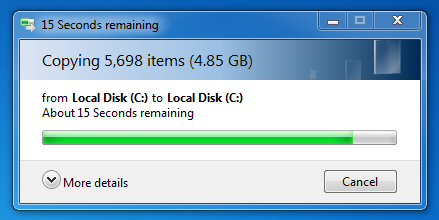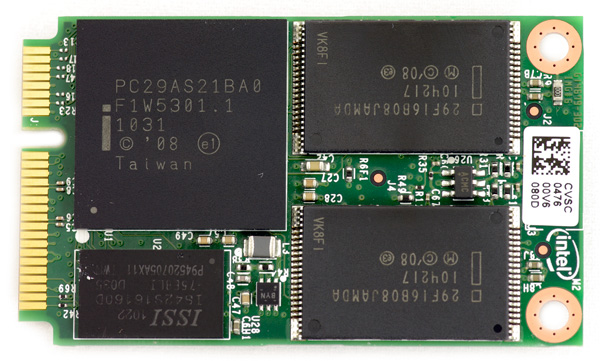Notebooks: One Drive Only?
Enthusiasts with SSDs are loathe to swap back to mechanical storage. And for good reason. Wonderful though they might be for cramming lots of information into a compact space, disk drives aren't as responsive, and they're not as fast. Getting the best of each world often involves a desktop machine with both technologies under the hood. Use a decently-sized SSD for loading Windows and performance-sensitive apps, then throw your other programs and user data on the big disk.
Unfortunately, mobility often precludes such a luxury. Compact enclosures mean that storage is usually limited to a single drive. Only the larger notebook chassis give you room for two or more disks, and those are commonly desktop replacements--hardly ideal candidates for getting dragged back and forth from class each day. Looks like it's time to make a choice. SSD or hard drive; which will it be?
It's fair to say that, given the choice, most enthusiasts would opt for solid-state technology over a hard drive any day of the week. The problem, of course, is that an SSD gives you limited capacity. Not only that, but it's comparatively very, very expensive when you look at cost per gigabyte. An SSD in a laptop sounds nice, but getting enough space for your OS, games, apps, and information is only really affordable for a fortunate few. Everyone else gets to drool over the killer data rates and plug along on 2.5" 7200 RPM disks, at best.
If only it were possible to mix and match storage technologies using conventional hard drives and solid-state storage packed into a more space-conserving form factor.
That's exactly what Intel is trying to do with its Solid-State Drive 310-series--small form-factor SSDs aimed at some of the most mobile environments you could imagine. Designed to work in a mSATA interface and available in capacities of 40 or 80 GB, we could be looking at the answer to hybrid storage subsystems in thin-and-light designs. Additionally, Intel is aiming at the netbook, mini/sub-notebook, all-in-one, and embedded markets.
In one fell swoop, the company claims to be addressing size, weight, power, performance, and reliability issues with which 2.5" and 1.8" hard drives cannot compete. Is this the end-all for the folks who sit in front of online configurators trying to figure out if it's worth spending so much extra money on an SSD, when they really need the space afforded by that 320 or 500 GB hard drive?
We set up a handful of different usage scenarios with the goal of digging deeper. Lets dissect the SSD 310-series and what it might do for your next mobile machine.
Get Tom's Hardware's best news and in-depth reviews, straight to your inbox.
Current page: Notebooks: One Drive Only?
Next Page Meet Intel's SSD 310: Like X25-V, Only Smaller-
Annisman Great article!Reply
Been rocking an SSD for about a year now, and there is no going back to mechanical drives, SSD for the laptop segment makes even more sense. I think most of us however would like to see price drops a bit faster though, my 120GB OCZ Vertex Turbo cost me over 500 dollars. -
acku Reply9509117 said:Great article!
Been rocking an SSD for about a year now, and there is no going back to mechanical drives, SSD for the laptop segment makes even more sense. I think most of us however would like to see price drops a bit faster though, my 120GB OCZ Vertex Turbo cost me over 500 dollars.
I believe the last report I read mentioned close to 60% of all SSD purchases are mobile related. SSDs can really mark up a notebook's price, so I'm right there with you on prices. We need price drops, more of them, and in quicker succession.
Cheers,
Andrew Ku
TomsHardware.com -
alyoshka It's high time they came up with the ROM or CMOS chip that has the capacity to just store the OS on it and a few other programs, that itself will make the system really very fast..... then they could go over for a change to the 6GBps SATA drives and make them work at that speed..... Really, we already have ample RAM and expandable slots for them, why not get a little more creative and just get the job done instead of going all the way round and trying this approach.Reply
We have fast, extremely fast drives but at prices that touch the sky, wouldn't it be better to just have loaded or embedded the OS straight onto the mobo.... cheaper until it's capable of handling the high data flow rates offered by SSD... yet not being able to saturate the SATA flow rates or capacities..... -
amk09 Newegg Daily Shell Shocker has a 128GB Kingston SSD on sale for $119.99!!!!!!!!!!!!!!!!!!!!!!!!!!!!!!!!!!!!!Reply
History has been made. SSD's are finally starting to hit a dollar/GB. Keep those prices dropping! -
druids84 Although I of course would enjoy having 120+GB SSD on my laptop or home desktop, only true photo/video professionals or gamers with ample games need that much fast storage! I am able to squeeze Win7 and several Valve games within my old 30GB OCZ Vertex SSD, and I would feel quite comfortably with having 64GB SSD just to have more breathing space. You do NOT need more than that unless you're processing a lot of photos/videos. 120+GB is only if you include movies and music. You don't need 20,000 IOPs or 250MB/s seq.reads for your movies and other sitting junk! ;) Just buy a cheap external 2.5" HDD and store all your movies/music/photos on that, and this solution is quite mobile if you drag your laptop everywhere!Reply -
Travis Beane druids84Although I of course would enjoy having 120+GB SSD on my laptop or home desktop, only true photo/video professionals or gamers with ample games need that much fast storage! I am able to squeeze Win7 and several Valve games within my old 30GB OCZ Vertex SSD, and I would feel quite comfortably with having 64GB SSD just to have more breathing space. You do NOT need more than that unless you're processing a lot of photos/videos. 120+GB is only if you include movies and music. You don't need 20,000 IOPs or 250MB/s seq.reads for your movies and other sitting junk! Just buy a cheap external 2.5" HDD and store all your movies/music/photos on that, and this solution is quite mobile if you drag your laptop everywhere!My Steam folder alone is 437GB. I have another 100GB+ on non steam games also. Then add my OS and etc.Reply
I currently enjoy the faster speeds of 4x500 RAID 0 with the OS on a 1TB. I would actually be running 8x500GB RAID 0 if my case was large enough, and my graphics card weren't so large (blocks 2 slots).
How does Toms feel about doing a showdown between $500 of modern HDD vs $500 of modern SSD? With and without a dedicated controller.
I know for my next build I don't know whether I want 4x 3TB or a 3TB with 2-3x SSD or 3x 3TB with a single small SSD, or is it better to go with, say, 8x 1TB or 4x 3TB in either RAID 0, 10, 5, 6, 50, 60 etc. :) -
druids84 Well, just as I mentioned earlier, my point still holds: you DON'T need more than 120+GB unless you're serious gamer or professional working in multimedia business. And your setup sounds a bit like "gamer with ample games" case from my argument. ;) I really can't see a way I could squeeze 4x RAID in ordinary non-gaming laptop, which is what many if not most of people use for actually doing their work.Reply
So, if I would have to choose between old-school 500GB HDD, overkill 256GB SSD, or just simple 60-128GB SSD + external 2.5" HDD for a laptop, I'd go with the last one. -
romulous75 meh, when I added an SSD drive I did not notice much improvement. I have a raid 5 array of WD2003FYYS drives which use to be the boot drive ;)Reply -
romulous75 oh, and also I seem to be the first one loaded in COD black ops when it changes levels :)Reply

